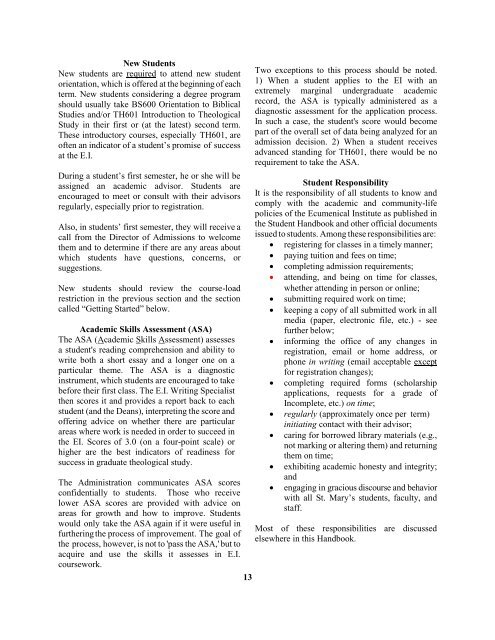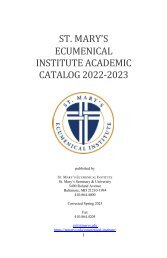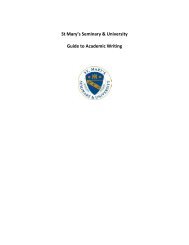EI Student Handbook 2022-2023
This Student Handbook supplements the current academic policies and procedures, which are published on our website. It also provides practical guidance for study and life within St. Mary’s Ecumenical Institute. We hope it serves as a tool of both communication and community.
This Student Handbook supplements the current academic policies and procedures, which are published on our website. It also provides practical guidance for study and life within St. Mary’s Ecumenical Institute. We hope it serves as a tool of both communication and community.
You also want an ePaper? Increase the reach of your titles
YUMPU automatically turns print PDFs into web optimized ePapers that Google loves.
New <strong>Student</strong>s<br />
New students are required to attend new student<br />
orientation, which is offered at the beginning of each<br />
term. New students considering a degree program<br />
should usually take BS600 Orientation to Biblical<br />
Studies and/or TH601 Introduction to Theological<br />
Study in their first or (at the latest) second term.<br />
These introductory courses, especially TH601, are<br />
often an indicator of a student’s promise of success<br />
at the E.I.<br />
During a student’s first semester, he or she will be<br />
assigned an academic advisor. <strong>Student</strong>s are<br />
encouraged to meet or consult with their advisors<br />
regularly, especially prior to registration.<br />
Also, in students’ first semester, they will receive a<br />
call from the Director of Admissions to welcome<br />
them and to determine if there are any areas about<br />
which students have questions, concerns, or<br />
suggestions.<br />
New students should review the course-load<br />
restriction in the previous section and the section<br />
called “Getting Started” below.<br />
Academic Skills Assessment (ASA)<br />
The ASA (Academic Skills Assessment) assesses<br />
a student's reading comprehension and ability to<br />
write both a short essay and a longer one on a<br />
particular theme. The ASA is a diagnostic<br />
instrument, which students are encouraged to take<br />
before their first class. The E.I. Writing Specialist<br />
then scores it and provides a report back to each<br />
student (and the Deans), interpreting the score and<br />
offering advice on whether there are particular<br />
areas where work is needed in order to succeed in<br />
the <strong>EI</strong>. Scores of 3.0 (on a four-point scale) or<br />
higher are the best indicators of readiness for<br />
success in graduate theological study.<br />
The Administration communicates ASA scores<br />
confidentially to students. Those who receive<br />
lower ASA scores are provided with advice on<br />
areas for growth and how to improve. <strong>Student</strong>s<br />
would only take the ASA again if it were useful in<br />
furthering the process of improvement. The goal of<br />
the process, however, is not to 'pass the ASA,' but to<br />
acquire and use the skills it assesses in E.I.<br />
coursework.<br />
13<br />
Two exceptions to this process should be noted.<br />
1) When a student applies to the <strong>EI</strong> with an<br />
extremely marginal undergraduate academic<br />
record, the ASA is typically administered as a<br />
diagnostic assessment for the application process.<br />
In such a case, the student's score would become<br />
part of the overall set of data being analyzed for an<br />
admission decision. 2) When a student receives<br />
advanced standing for TH601, there would be no<br />
requirement to take the ASA.<br />
<strong>Student</strong> Responsibility<br />
It is the responsibility of all students to know and<br />
comply with the academic and community-life<br />
policies of the Ecumenical Institute as published in<br />
the <strong>Student</strong> <strong>Handbook</strong> and other official documents<br />
issued to students. Among these responsibilities are:<br />
• registering for classes in a timely manner;<br />
• paying tuition and fees on time;<br />
• completing admission requirements;<br />
• attending, and being on time for classes,<br />
whether attending in person or online;<br />
• submitting required work on time;<br />
• keeping a copy of all submitted work in all<br />
media (paper, electronic file, etc.) - see<br />
further below;<br />
• informing the office of any changes in<br />
registration, email or home address, or<br />
phone in writing (email acceptable except<br />
for registration changes);<br />
• completing required forms (scholarship<br />
applications, requests for a grade of<br />
Incomplete, etc.) on time;<br />
• regularly (approximately once per term)<br />
initiating contact with their advisor;<br />
• caring for borrowed library materials (e.g.,<br />
not marking or altering them) and returning<br />
them on time;<br />
• exhibiting academic honesty and integrity;<br />
and<br />
• engaging in gracious discourse and behavior<br />
with all St. Mary’s students, faculty, and<br />
staff.<br />
Most of these responsibilities are discussed<br />
elsewhere in this <strong>Handbook</strong>.







